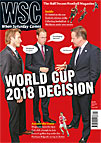 Why it should come as no surprise that England failed to capture the 2018 World Cup
Why it should come as no surprise that England failed to capture the 2018 World Cup
You would have needed a heart of stone not to laugh at the peeved expressions of the England 2018 delegation as the World Cup hosting announcement was made. They shouldn’t have been surprised; everyone who has taken an active role in the 2018 bidding process will have known that England’s campaign was screwed a while ago.
The English bid committee will now try to deflect from their failure by blaming the unhelpful media. Chief executive Andy Anson had already raged at the “sensationalist and unpatriotic” Panorama programme, alleging that leading FIFA officals were bribed in a TV rights deal, long before it was broadcast three days before the vote.
Certainly the Sunday Times investigation in October in which two of FIFA’s 24-man voting panel, Amos Adamu and Reynald Temarii, appeared to suggest that their support could be purchased, was a monumental embarrassment for FIFA. Their subsequent suspension for three years and one year respectively looked like the mildest of rebukes, though Sepp Blatter claimed that some of his colleagues thought it was harsh. While committee member Mohammed bin Hammam from Qatar raged about the “unethical nature” of the undercover filming, his observation that “one thing about the Middle East media, these are rare happenings there” simply highlighted the fact that many senior figures within FIFA are accustomed to dealing with a compliant, government-controlled press.
But the investigations of FIFA by sections of the UK media were entirely justified – the criteria used for assessing World Cup bids is needlessly secretive and there is no good reason for the final decision to rest with such a small group of people (24 – reduced to 22 this time – as opposed to the 106 IOC voters who decide on the Olympic hosting). As it is, FIFA’s executive committee, none of whom is an expert in stadium design, transport policy or economics, are treated like potentates for the duration of the bidding process, ferried between airports, stadiums and five-star hotels.
While being showered with favours some even take opportunities to earn a bit of extra spending money – vice president Jack Warner and his family sold all of Trinidad’s official allocation for the 2006 World Cup at inflated prices but most of the £1 million fine imposed on them remains unpaid, and Warner held on to his position. Such things convey the impression that Blatter is serenely indifferent to what his associates get up to. What does concern him is the media coverage when they are caught, the sort of thing that might make sponsors nervous and even jeopardise his re-election.
The world of privilege and deference inhabited by the FIFA elite can make them appear almost untouchable. The organisation’s statutes prevent “political interference” in national football associations, which periodically lead to countries being suspended from international football. In practice such measures effectively protect administrators from investigation. It also seems incredible that the profits FIFA make from a World Cup, which amounted to over $3 billion in 2010, are required to be exempt from taxation in the host country. Needless to say, FIFA won’t anticipate having problems in this regard from the governments of Russia and the 2022 winners, Qatar.
For all the bluster stirred up by the Sunday Times and BBC investigations, their criticism of FIFA was not the reason for the England’s bid failure. It was fatally hampered by almost constant disarray behind the scenes and a woeful lack of leadership – their official complaint, later retracted, about the Russian bid leader’s criticisms of the UK made them look pompous and absurd. The FA has had no chairman since the departure of Lord Triesman in May after he was recorded claiming that Spain and Russia planned to bribe referees at the 2010 World Cup.
One of Triesman’s predecessors, the ghostly Geoff Thompson, replaced him as leader of the bid to no discernible effect – “I don’t know who to talk to,” said UEFA president Michel Platini on a summer trip to London – while stories continued to leak out about factionalism among the committee members. More generally, the English are perceived as outsiders by the FIFA hierarchy. Since Sir Stanley Rous was voted out as president in 1974 they have played only minor roles in the running of the organisation; frantic networking at the 11th hour was no substitute for steadily building a support base over time.
There is unlikely to be another European host until at least 2030, by which time the fabled national coaching centre at Burton may even have been built. But as cuts of £162m to the schools sports budget have just been announced, there may not be much use for it by then.
From WSC 287 January 2011